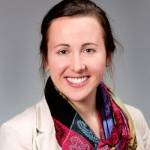Written by Lauren Hall, Indiana Circle Leader and State Leadership Council Chair and Rachel Labi, YES Fellow and co-founder of Building Financial Freedom
Rachel Nyarkoah Labi is one of the incredible young lady leaders with whom I get to work through Indiana Youth Fellows—which is programmed by VOICES in partnership with the Commission on Improving the Status of Children in Indiana, and funded by the Annie E. Casey Foundation. As an Indiana Youth Fellow, Rachel and her peers learn to apply their personal and proximate experiences with systemic inequities to advance collective change efforts to ensure that all Hoosier youth and families can thrive. Through four months of intensive training on story-telling, relationship-building, and systems-change philosophies and practices, Youth Fellows are prepared to bring a critical, loving eye to the schools, organizations, and institutions meant to serve them. Rachel exemplifies the spirit of Youth Fellows in adeptly linking stories and statistics to a call for action. In the article below, she outlines the critical need for financial literacy education for our Indiana youth, which—coupled with equitable wages and diverse access points to education and career advancement—will enable our state the economic and cultural vitality we aspire. I continue to be humbled, and inspired by, the clarity of conviction our Youth Fellows demonstrate and look forward to supporting Rachel and her peers with the ongoing work required to achieve their goals. If you would like to support our work by having a mentoring conversation with one or more Youth Fellows to provide your insights on policy-making and systems change, or to get involved in the work our Youth Fellows are doing to prompt change, please contact me.
To learn more about this issue, read The Policy Circle’s Financial Literacy Brief—particularly the “Status of Personal Finance Education Across the Nation 2020,” which highlights the systemic gap in financial education that Rachel names—and watch the Policy Circle’s “Move the Needle Virtual Experience: Achieving Financial Freedom” during with our Indiana State Treasurer, Kelly Mitchell, provides insights and guidance.
———
When Nina was 14 years old, she found herself working every day after school to support herself due to her mother’s drug addiction. When her mother kicked her out, she took refuge on friends’ couches. Amidst this, she also struggled with physical pain that required a root canal. She refused to go to the dentist knowing she lacked insurance to cover the cost. When the pain finally got too intense to manage, she went to the dentist and ended up having to spend all of her savings during her freshman year of college. She was also not allowed to attend part of her senior year of high school due to not being able to afford the cost of getting vaccinated, and thus was unable to comply with her high school’s vaccination requirements.
Nina is not alone in her story. The child poverty rate in Indiana is around 18%, and 11.9% of Indiana’s population lives below the poverty line. In a nation rampant with debt and economic instability, it is essential that we equip our youth with an understanding of financial literacy and how to manage finances and necessary debt. Each day, we maneuver through a pandemic that has forced us to re-evaluate our priorities and adjust our national, state, and local budgets. As a state, we need to prepare youth to not only survive financially, but to thrive and prosper in this nation, even when emergencies arise. Indiana prides itself on being fiscally conservative, so we have even more reason for this kind effort to be furthered. To do this, we must find common ground on both sides of the political spectrum and collaborate on policies to increase financial literacy across the nation.
America suffers from many plagues: poverty, debts of all kinds, homelessness, economic inequality…Nina herself suffered from many of these. However, education can be a tool to diminish and eliminate the spread of these plagues. I was fortunate enough to be enlightened about Nina’s story, and we became friends and collaborators in the effort to make positive change through YES Fellows. Now, Nina is working two jobs and attending college as a chemistry student. Despite Nina’s accomplishments, education on personal finance could have more easily provided a foundation of success. Financial education could have allowed her to find insurance coverage plans for independent youth. It could have also helped her know how to manage and pay off her debt. Youth across Indiana need to know the value of money, and how to divert those funds to savings, investments, and other avenues. In a nation where student debt has surpassed $1 trillion, money worries are ever growing, and we cannot wait to have this conversation with our youth.
After learning more about debt and personal finance, Nina and I developed a proposal for a mandatory financial literacy class in Indiana secondary schools. Less than half of the states in America require students to take a course on personal finance. Although every school in Indiana offers the course, it is not mandatory. This requirement could diminish the amount of youth who go into the worlds of loans, banking, and investments unprepared. For those that do need to take on necessary debt, it is important for them to have a clear understanding of how to manage this debt, pay it off overtime, and continue to pursue an economically stable and thriving life. Simply thinking about finances alone causes anxiety in about 50% of Americans. This is knowledge everyone needs in life, so it is sensible to offer it through an experience in which virtually everyone participates in and is mandated by law: school.
At the YES Fellow Fall 2020 summit that we led in partnership with VOICES and the Commission on Improving the Status of Children in Indiana, I presented this proposal to hundreds of policymakers, systems-leaders, and practitioners across Indiana. Through this experience, I realized the importance of across-the-aisle work. In a nation that is increasingly more polarized, it can be difficult to find common ground on issues. However, I found Democrats and Republicans alike supporting me in my journey. Both sides saw the need for youth from all backgrounds to be set up for success, and they valued my proposal as a means of doing that. Senator Jean Breaux of District 34 and Representative Mike Karickhoff both contacted me to turn the proposal into a reality. In the next few months, I plan to form a committee with Representative Karickhoff and other Republicans to make this class a reality. I will also be working on a statewide campaign that fosters collaboration with banks and Indiana schools to increase financial education and resources. My role working with our two major political parties continually teaches me that we need to not focus on Democrats vs. Republicans, or liberals vs. conservatives, if we want to create lasting change to help set our children up for success.

